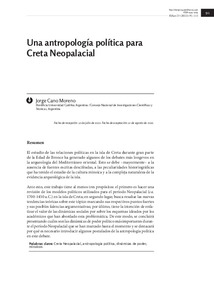Please use this identifier to cite or link to this item:
https://repositorio.uca.edu.ar/handle/123456789/16407| Título: | Una antropología política para Creta Neopalacial A political anthropology for Neopalatial Crete |
Autor: | Cano Moreno, Jorge | Palabras clave: | CRETA; DINAMICA CULTURAL; PODER POLITICO; ANTROPOLOGÍA; HISTORIA ANTIGUA | Fecha de publicación: | 2022 | Editorial: | Universidad de Buenos Aires. Facultad de Filosofía y Letras. Instituto de Historia Antigua Oriental | Cita: | Cano Moreno, J. Una antropología política para Creta Neopalacial [en línea]. Revista del Instituto de Historia Antigua Oriental. 2022, (23). doi: 10.34096/rihao.n23.12307. Disponible en: https://repositorio.uca.edu.ar/handle/123456789/16407 | Resumen: | Resumen: El estudio de las relaciones políticas en la isla de Creta durante gran parte
de la Edad de Bronce ha generado algunos de los debates más longevos en
la arqueología del Mediterráneo oriental. Esto se debe –mayormente– a la
ausencia de fuentes escritas descifradas, a las peculiaridades historiográficas
que ha tenido el estudio de la cultura minoica y a la compleja naturaleza de la
evidencia arqueológica de la isla.
Ante esto, este trabajo tiene al menos tres propósitos: el primero es hacer una
revisión de los modelos políticos utilizados para el período Neopalacial (ca.
1700-1450 a.C.) en la isla de Creta; en segundo lugar, busca resaltar las nuevas
tendencias teóricas sobre este tópico marcando sus respectivos puntos fuertes
y sus posibles falencias argumentativas; por último, tiene la intención de enfatizar
el valor de las dinámicas sociales por sobre los esquemas ideados por los
académicos que han abordado esta problemática. De este modo, se concluirá
presentando cuáles son las dinámicas de poder político más importantes durante
el período Neopalacial que se han marcado hasta el momento y se destacará
por qué es necesario introducir algunos postulados de la antropología política
en este debate. Abstract: The study of political relations on the island of Crete during much of the Bronze Age has sparked some of the oldest debates in the archaeology of the Eastern Mediterranean. This is mainly due to the absence of deciphered written sources, the historiographical peculiarities that the study of Minoan culture has had, and the complex nature of the archaeological evidence on the island. For such reasons, this paper has at least three purposes: the first is to review the political models employed for studying the Neopalatial period (ca. 1700-1450 BC) on the island of Crete; secondly, it seeks to highlight new theoretical trends on this topic, pointing out their respective strengths and possible argumentative shortcomings; finally, it intends to emphasize the value of social dynamics over the schemes devised by academics who have addressed this problem. In this way, we will conclude by presenting the most important dynamics of political power during the Neopalatial period that have been presented so far, and it will be highlighted why it is necessary to introduce some postulates of political anthropology in this debate. |
URI: | https://repositorio.uca.edu.ar/handle/123456789/16407 | ISSN: | 2683-9660 (en línea) 0325-1209 (impresa) |
Disciplina: | HISTORIA | DOI: | 10.34096/rihao.n23.12307 | Derechos: | Atribución-NoComercial-CompartirIgual 4.0 Internacional | Fuente: | Revista del Instituto de Historia Antigua Oriental. 2022, (23) |
| Appears in Collections: | Artículos |
Files in This Item:
| File | Description | Size | Format | |
|---|---|---|---|---|
| antropologia-politica-creta.pdf | 809,38 kB | Adobe PDF |  View/Open |
Page view(s)
81
checked on Apr 27, 2024
Download(s)
23
checked on Apr 27, 2024
Google ScholarTM
Check
Altmetric
Altmetric
This item is licensed under a Creative Commons License

